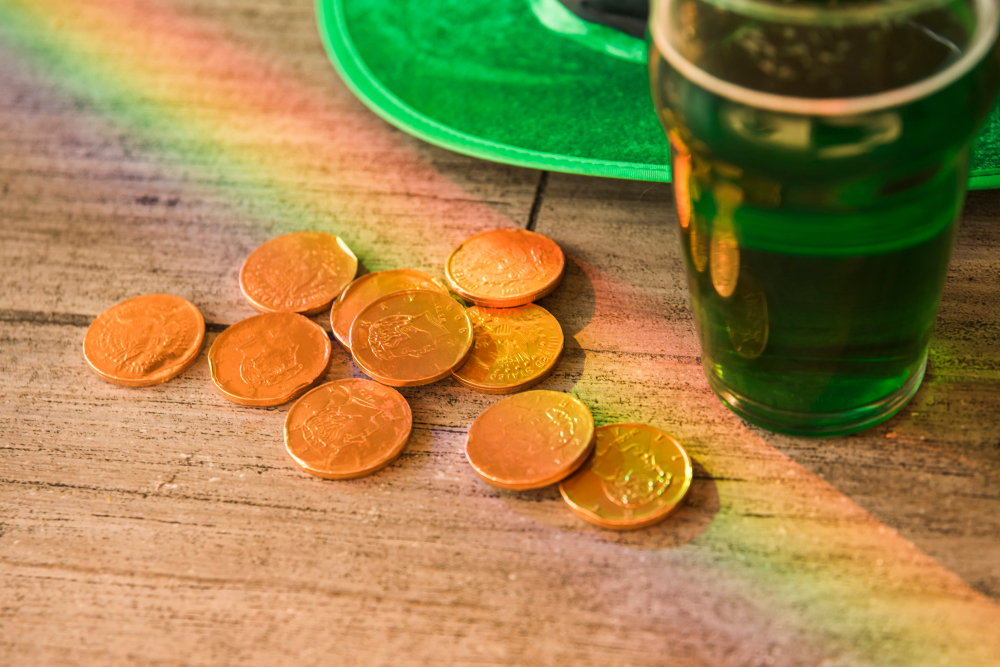If you’re planning your trip to Ireland, one of the first questions that comes up is what currency is used, how to pay in the country, and how much money you’ll need for day-to-day expenses. Here’s a clear, practical, and easy-to-read guide so you can arrive prepared and without surprises.
Currency
On the island of Ireland, two different currencies are used depending on the territory:
Republic of Ireland
Official currency: Euro (EUR)
The euro is divided into 100 cents and comes in banknotes of 5, 10, 20, 50, 100, 200 and 500 euros. Coins range from 1 cent to 2 euros.
This is the currency you’ll find in Dublin, Cork, Galway, Limerick and most of the country.
Northern Ireland
Official currency: Pound sterling (GBP)
The pound is divided into 100 pence. The most common banknotes are 5, 10, 20 and 50 pounds. Coins include 1, 2, 5, 10, 20 and 50 pence, as well as 1- and 2-pound coins.
If you visit Belfast or take excursions to the north, keep in mind that euros cannot be used there, although some shops accept both for convenience.
Credit and debit cards
Ireland is a highly digital country, and cards are accepted almost everywhere.
Visa and Mastercard are the most common.
American Express is accepted in fewer establishments.
Most payments are made contactless, either with a card or with your phone or smartwatch.
Chip-and-PIN is the standard system, so make sure you remember your code.
You can use your international card for payments and ATM withdrawals, but your bank may charge fees. It’s best to check this before your trip.
Banking services
If you’re going to live or study in Ireland for more than a few weeks, opening a local bank account can be very useful.
The main banks are AIB, Bank of Ireland and Permanent TSB. Typical opening hours are Monday to Friday from morning to mid-afternoon, and some branches open on Saturday mornings.
ATMs are widely available in cities and towns. In Ireland, people often call ATMs “the hole in the wall,” a very common informal expression.
Traveller’s checks
Traveller’s checks have practically disappeared in Ireland. Banks and shops no longer accept them regularly, so it’s not recommended to travel with them.
What is the best currency to bring to Ireland?
The best option is to bring euros if your destination is the Republic of Ireland. If you’re travelling to Northern Ireland, bring pounds sterling or exchange upon arrival.
If you bring US dollars, you can exchange them without a problem, but the rates vary depending on the exchange house or bank. Latin American currencies are rarely accepted, so they aren’t practical for travelling.
For a smooth trip, the ideal combination is:
Some cash (50 to 150 euros for the first days)
A debit or credit card for most payments
A digital card (like Revolut) if you plan to stay long-term
How do people pay in Ireland?
The most common methods are:
Contactless card
Mobile payments
Chip-and-PIN cards
Cash, though used less and less
In restaurants, supermarkets, and public transport, cards are the preferred method.
What currency is used in Dublin?
Dublin uses the euro, just like the rest of the Republic of Ireland.
There is no separate currency for the capital.
How much does a Coca-Cola cost in Ireland?
A 500 ml Coca-Cola usually costs between 2 and 3 euros depending on where you buy it:
Supermarket: around 2 euros
Small shops or tourist areas: about 3 euros
Restaurants or cafés: 3 to 4 euros
Study in Ireland with ELI Schools: Learn English and live one of the best experiences of your life
Now that you know how to manage money in Ireland, the most important part is left: making the most of your time in the country. And that’s where ELI Schools comes in.
At ELI, we help students from around the world achieve fluent and natural English. Whether you have professional goals, want to improve your job opportunities, or simply want to live a different experience, Ireland is the ideal place to do it.
With us, you can:
Learn truly useful English — the kind that opens doors in international companies.
Enjoy one of the best years of your life exploring the country, travelling, and making friends from all over the world.
Fall in love with Ireland — its lifestyle, its people, and its atmosphere — to the point where it might even become your home for years to come.
If you’re thinking about studying English abroad, Ireland offers quality of life, real opportunities and a safe environment to grow. And ELI Schools supports you every step of the way, from your arrival until you feel part of the community.
Sources
- European Central Bank — Ireland: Euro Coins
https://www.ecb.europa.eu/euro/coins/html/ie.en.html - Central Bank of Ireland — Banknotes and Coins https://www.centralbank.ie/consumer-hub/notes-and-coins
- Citizens Information — The Euro Currency https://www.citizensinformation.ie/en/money-and-tax/personal-finance/eu-payments/euro/
- Lloyds Bank Trade — Opening Hours and Bank Holidays in Ireland https://www.lloydsbanktrade.com/en/market-potential/ireland/opening-hours





